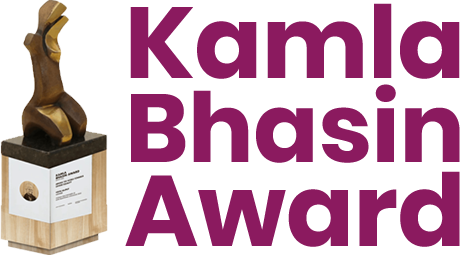Kamla Bhasin
Kamla Bhasin

Kamla Bhasin (24 April 1946–25 September 2021) was born in Shahidawalli village in Gujaranwala district in Punjab. One of six siblings, she moved with her family to Bharatpur in Rajasthan, where her father worked as a doctor. Her mother was a homemaker. Kamla was educated in Jaipur.
She became an icon of India’s women’s movement. Her spirit, slogans, poetry, songs, writings and speeches resonated with all, and made her stand out as a leader in the feminist movement.
Kamla co-founded Sangat, a South Asian women’s network, in April 1998. She was also a co-founder of Jagori, a women’s rights NGO in India. She wrote and published books, booklets, songs and stories, many of which have been reproduced in about 30 languages. An integral part of the global One Billion Rising movement, she was one of the coordinators for the ‘1000 women for the Nobel Peace Prize’ initiative in 2005.
Personal loss and tragedy motivated her to seek a deeper meaning of life in spirituality. She became a follower of Thich Nhat Hahn and Buddhist philosophy, though she remained receptive to all religious teachings.
Kamla was generous in her support of new ideas and actions. Her support to Azad Foundation and its work on non-traditional livelihoods was unwavering.
Kamla Bhasin Award
Kamla Bhasin Award for Driving Gender Equality Across South Asia has been constituted by Azad Foundation. The award is in memory of Kamla Bhasin, who was a friend and guide. She supported Azad’s work with her ideas and energetic participation that inspired hundreds of women and men trainees. Kamla was a leading feminist who advocated engaging with men towards gender equality. She believed that toxic masculinity dehumanises men and she came up with the popular slogan “Men of quality are not afraid of equality”.
This award intends to honour and celebrate her lifetime of achievements. It is also meant to encourage the efforts being taken by women, men and trans persons to fight patriarchy and work towards a gender-just society where women can acquire livelihoods with dignity and gain control over their lives and bodies. This is something Kamla worked tirelessly for, apart from her other passions and commitments.
The award will encompass South Asia and will include Afghanistan, Bangladesh, Bhutan, India, Maldives, Nepal, Pakistan and Sri Lanka. Entries will be accepted in all official languages of the eight countries. There will be two award categories, each for INR 100,000 (one hundred thousand Indian rupees) that will recognize one individual in each category:
Category I
A woman (cis/trans) practitioner of Non-Traditional Livelihood (NTL)
Category 2
A male (cis/trans) who has worked towards enabling a gender-just ecosystem by working with boys/men
Selection Criterion
Category 1
- Practicing a non-traditional livelihood in her/their context for the last 3 years
- Empowered herself/themselves to gain control over not just her/their earnings, but also her/their life
- Is a change agent and created opportunities for others
Non-traditional livelihoods are those which break the glass or rather a concrete ceiling and walls put around the women by virtue of belonging to a certain caste, community, religious group, or because of their sexual orientation, their gender identity, disability, their habitat, and this list can be long, and varied depending upon the discrimination structures that exist in any society. Gender norms around unpaid work and mobility for example have been one of the reasons for women not being allowed to take on occupations such as driving or masonry which requires them to be away from home for a large part of the day and also night. You can read more about non-traditional livelihoods and some examples from around the region by clicking here.
Category 2
- Working with men/boys towards a gender-just world in the last 5 years
- Countering harmful masculinity in personal and work life by contributing in care work, accepting women’s leadership, combating all forms of gender-based violence and gendered socio-cultural norms
- Is a change agent and influenced other men to enable gender just world
Engaging boys and men in promoting gender equality is a growing movement. Kamla’s slogan, “Men of Quality are not afraid of Equality,” highlights the importance of men challenging patriarchal norms. This category aims to recognize such men who have examined patriarchal practices in their lives, acknowledge their privileges, and recognize the constraints of patriarchy. We seek men who actively work with other males to confront harmful practices, oppose violence against women and sexual minorities, share responsibility for domestic care work, and support women and transgender individuals in claiming their rights. Our goal is to cultivate supportive environments for these change agents to learn from each other and inspire others to advocate for gender equality.
Timeline
| March 8, 2024 | Opening of application process |
| June 7, 2024 | Closing of application process |
| July-August 2024 | Shortlisting and interview of candidates |
| September 2024 | Announcement of the Winners |
| November 30, 2024 | Award Ceremony in New Delhi |
The Jury
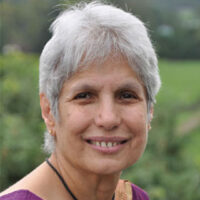
Anu Aga
India
Anu Aga is a social worker by training. The Thermax Board appointed Anu as the Executive Chairperson. After retiring, she devoted her time to primary education for the economically underprivileged. She has been on the board of Akansha for over 2 decades and helped launch Teach for India (TFI). She retired as Chairperson of TFI and is still on their board. Anu has been active in the Confederation of Indian Industry (CII). She served for 6 years as a member for the Rajya Sabha.
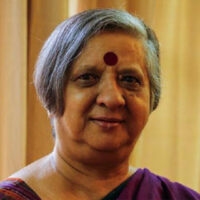
Khushi Kabir
Bangladesh
Khushi Kabir is a social activist, feminist and environmentalist. She is currently the coordinator of Nijera Kori. She is also involved in an honorary capacity in various national, regional and global forums such as Member, Board Trustees of the Centre for Policy Dialogue; Regional Advisor for Sangat; and Bangladesh Coordinator for the One Billion Rising global campaign.
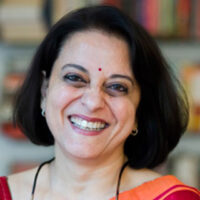
Namita Bhandare
India
Namita Bhandare is an award-winning journalist with 30 years of reporting experience for various publications including the magazines Sunday, India Today, and the daily Hindustan Times. In 2013, she was appointed India’s first gender editor for Mint newspaper and was there until 2016. She has authored a series of articles on women and work.
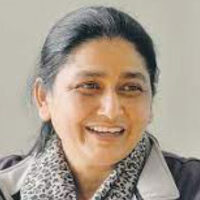
Binda Pandey
Nepal
Binda Pandey is a Nepalese Political activist. A former member of the Federal Parliament, representing the Communist Party of Nepal, she was also a member of the 1st Nepalese Constituent Assembly (2008). Binda has served as Deputy General Secretary of the General Federation of Nepalese Trade Unions during 2004–2009. She represented the Asia Pacific trade union in the ILO Governing Body for a decade (2011-2021). She has written books on “Women Participation in Nepalese Trade Union Movement” and “Women in Nepali Politics”
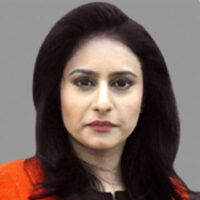
Munizae Jahangir
Pakistan
Munizae Jahangir is the editor in chief of Voicepk.net, Pakistan’s first digital media platform focusing on human rights issues. She is an award-winning TV journalist and documentary filmmaker, currently anchoring a prime-time current affairs show called ‘Spotlight’ on Aaj TV. She is an elected council member of Human Rights Commission of Pakistan; an elected Board member of SAHR (South Asians for Human rights) and the founder of SAWM (South Asian Women in Media) She was honoured as Young Global Leader by WEF in 2008.
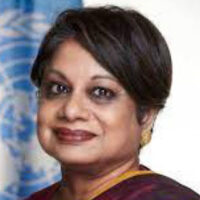
Radhika Coomaraswamy
Sri Lanka
Radhika Coomaraswamy is a renowned lawyer, diplomat and human rights advocate who served as UN Under Secretary General and as Special Representative of the Secretary General on Children and Armed Conflict from 2006 until her retirement in 2012. From 1994 to 2003, she was the UN Special Rapporteur on Violence against Women. In 2017 she was appointed to the UN Fact Finding Mission on Myanmar and also appointed as a member of The Secretary General’s Board of Advisors on Mediation. In June 2022, she was appointed as a Member of the International Commission of Human Rights Experts in Ethiopia.
Award Partners

Azad Foundation is a feminist organisation working across social and religious divides, enabling resource-poor women to empower themselves by engaging in viable non-traditional livelihood options. Established in 2008, Azad has enabled over 3000 women to become employable chauffeurs. The women have cumulatively earned more than 2.5 million USD and provided over 1.7 million safe rides.
Azad works with Kishoris (adolescent girls) helping them aspire to non-traditional livelihoods; engages with young men to articulate alternate forms of masculinity and work towards prevention of violence against women. Feminist community leaders trained by Azad have supported thousands of women to get their citizenship documents and access social services.
To read more about the work of Azad, please go to www.azadfoundation.com
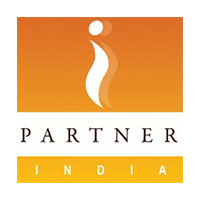
iPartner India, a charity organisation based in the UK, has a vision to create an equitable India – where poverty levels are reduced and where every person has equal opportunities regardless of gender, caste, or socio-economic background. We have 16 years of experience working directly and in partnership with local NGOs that are transforming the lives of the underprivileged and marginalised by helping them become part of the mainstream.
iPartner India focuses on preventing commercial sexual exploitation of children, facilitating quality education for children, enabling dignified livelihoods for women, promoting leadership for young people through sports, and working on climate adaptation and mitigation.
To read more about the work of iPartner India, UK please go to www.ipartnerindia.org
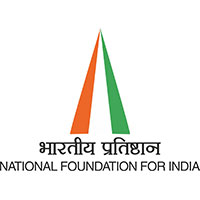
National Foundation for India (NFI) is committed to enabling social justice through civic engagement, responsive policy-making, and social accountability. Towards promoting social justice, NFI has worked with over 300 grassroots civil society organizations in 14 states since its inception in 1992.
NFI enables marginalised communities to better their lives by improving public understanding of social issues to promote social justice. Driven by the vision of a plural, equitable and democratic society rooted in Constitutional values, NFI was set up as India’s first independent domestic philanthropy. NFI works by strengthening civil society organisations, peace building programs and media fellowships for independent journalists who focus on marginalised communities, especially women.
To read more about the work of NFI, please go to www.nfi.org.in
Past Winners
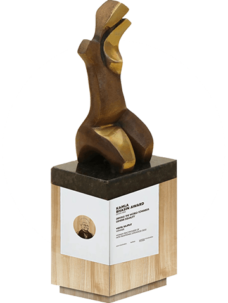
Jayasree P.K and Mahendra Kumar from India won the second Kamla Bhasin Award for Driving Gender Equality Across South Asia. Parina Subba Limbu from Nepal and Farhan Javed Akhter from India won the Special Jury Award. While Jayasree won the award under category one, which is for a woman (cis/trans) practicing Non-Traditional Livelihood, Mahendra was awarded under category two of the award, which is meant for a male (cis/trans), who has worked towards enabling a gender-just ecosystem. Parina and Farhan are the winners of Special Jury Award in the categories one and two respectively.
The winners were felicitated at the award ceremony held on 26 November 2023 in Delhi, India. The award includes a citation in the form of a trophy and a cheque of INR 100,000 each and the Special Jury Award consists of a citation in the form a trophy.
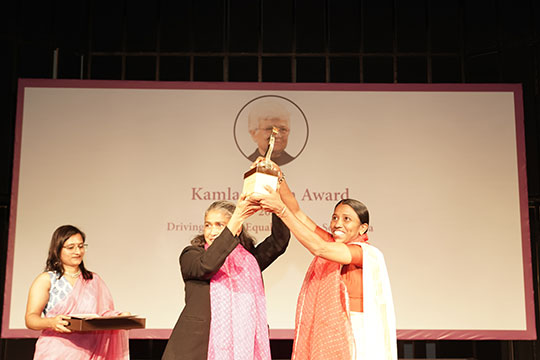
Winner: Category 1
Jayasree P.K
Kerala, India
Jayasree is a mason by profession and was the first woman in her village to have been trained in masonry and become a supervisor. She has been active in the profession since 1995 and over the years, Jayasree has not only been constructing buildings and other structures but also training other women. She has led a team of 5-6 women to construct 15 big rain water harvesting structures. They also constructed 10 houses for the tsunami affected families. In the period 2004 – 2005 they took up projects under the panchayat’s Ashraya project and constructed houses. Jayasree continues to work as technical manager at Archana Women’s Center, supervising construction works at their sites.
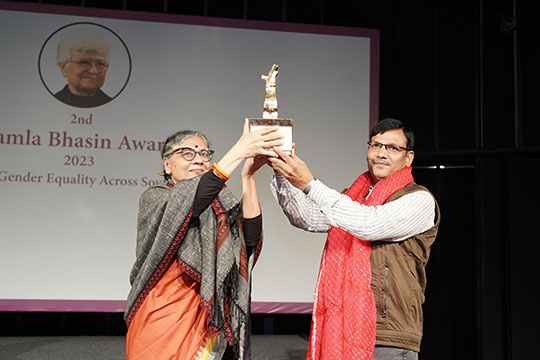
Winner: Category 2
Mahendra Kumar
Uttar Pradesh, India
Mahendra has been working on the issues of gender equality and challenging hegemonic masculinity for the last two decades. He remembers feeling uncomfortable with the caste based discrimination that he would witness in his own family since he was very young. In 1997, a training with Lucknow-based NGO Sahbhagi Shikshan Kendra shifted his perspective regarding the larger inequality in society, its structural causes and impact on the lives of people. He joined Centre for Health & Social Justice in 2004 and worked in several states of India. He has engaged actively with the work of networks such as – MASVA (Men Against Sexual Violence) and FEM (Forum to Engage Men).
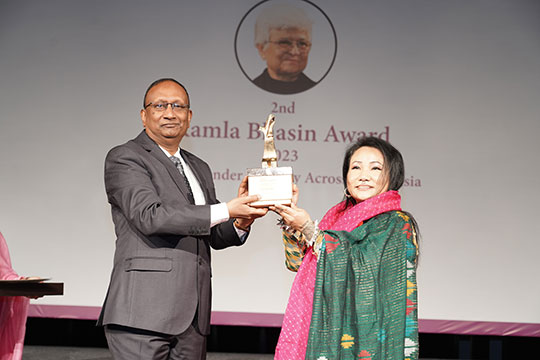
Special Jury Awardee: Category 1
ParinaSubba Limbu
Kathmandu, Nepal
Parina is the founder of the first organisation led by women drug users in Nepal, named Dristi Nepal. From being a vulnerable, helpless woman who contemplated suicide, she has been able to build an institution to advocate for the rights of women in similar circumstances. Parina says that she learnt to speak for herself, and once she was able to support herself financially, she learnt how powerful it is for women to be able to earn and believe in themselves. The sense of purpose that she feels now, motivates her to learn something new every day.

Special Jury Awardee: Category 2
Farhan Javed Akhter
Maharashtra, India
Farhan has been working with boys and men to challenge patriarchy, gender inequality, and regressive ideas of masculinity, actively since 2013. Incidents of sexual violence against women, especially the ‘Nirbhaya’ incident, impacted him deeply leading to a realization that a majority of young men are influenced by toxic masculinity. In 2013, Farhan co-founded an initiative called Men Against Rape and Discrimination (MARD). The MARD team engages with young boys in schools and colleges delivering positive messages of change on notions of masculinity, healthy romantic relationships and consent. Farhan has also been HeForShe ambassador of UN Women, apart from closely working with the Population Foundation of India on several projects.

Natisara Rai from Nepal and Vidya Rajput from India, the 2 winners were felicitated at the Award Ceremony held on 26th November 2022. Among the 2 award categories including, a) a woman (cis/trans) practitioner of non-traditional livelihood and b) a male (cis/ trans) who has worked towards enabling a gender-just ecosystem that encourages women to take on livelihoods with dignity, the Jury decided to not give any award in Category Two and as a result, two awards were given out in Category One. The award consisted of INR 100,000/- and a citation in the form of trophy.
Category
A Woman (Cis/Trans) Practitioner of Non-Traditional Livelihood

Natisara Rai
Founder and Executive Director, Shakti Milan Samaj
Kathmandu, Nepal
An HIV+ woman, and survivor of forced sex work, Natisara Rai is the co-founder and Executive Director of Shakti Milan Samaaj (SMS), an organization that supports over 1000 HIV+ women in Nepal to access dignified healthcare, literacy, livelihoods and education. At the age of 13, she was forced into sex work and trafficked to India. She continued to face social boycott and discrimination even after her rescue because she was HIV+. However, despite all odds, over the years she along with other survivors have been able to build a strong community through which they are able to resist injustices and extend solidarity.
Category
A Woman (Cis/Trans) Practitioner of Non-Traditional Livelihood
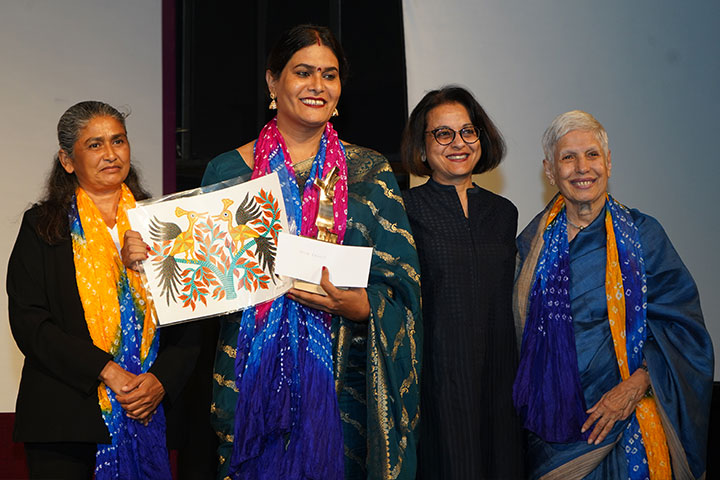
Vidya Rajput
Co-founder, MITWA Samiti
Chhattisgarh, India
Vidya Rajput, a transwoman from Bastar, Chhattisgarh, co-founded the organisation MITWA in 2009 to collectivize trans-people, advocate and raise awareness for their rights, including the right to self-identify, right to education, housing, employment, and healthcare. Vidya’s work with MITWA is rooted in her own life of struggle, hardship and discrimination. Over the years, through advocacy and training Vidya has been able to bring changes in the lives of trans people and influence state policy. She has successfully incorporated content related to transgender community into the State Board Education, B.Ed. and Police Training curriculums and has also enabled their recruitment in the Police department, industrial sector and municipal corporation in Chhattisgarh.
